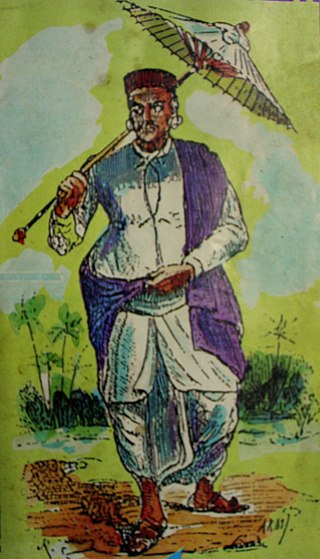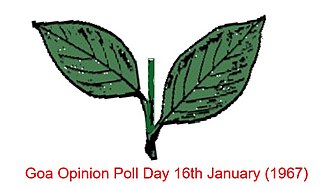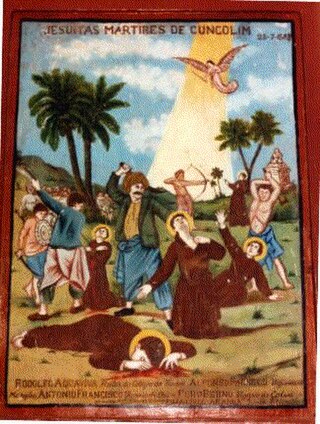Goan Catholics are Indian Christians from Goa, Daman and Diu on the western coast of India. They are Konkani people and speak the Konkani language. This indigenous population of the erstwhile Portuguese colony of Goa, Daman and Diu underwent Christianisation following the Portuguese conquest of Goa in 1510. The converts in the Velhas Conquistas (Old Conquests) to Roman Catholicism were then granted full Portuguese citizenship. [1]
Several Goan Catholics emigrated for economic reasons to various British colonies during the British Raj, thereby creating diaspora communities such as Pakistani Goans and Goans in the Swindon area of the UK.
Goans first worked for the British in 1779 at the time of the French Revolution, when the naval fleet of the British India was stationed in Goa. The British found the Christian Goans were eminently suitable because of their Western dress, diet and customs and when the fleets withdrew from Goa some time afterward, the Goans went with them. Goans who trained at the medical school also moved to other Portuguese colonies around 1842 after the first medical school was created Goans migrated to British India as well where there were more opportunities and economic development was occurring, which led to a demand for English language schools for these migrants which surpassed that of those educated in Portuguese. However, such was the demand that Goans began sending their children to neighbouring cities such as Bombay, Poona and Belgaum. Employment opportunities also arose in Karachi before the Indian Partition. [2]
Portuguese Goan community played a vital role in the Karachi's history and development. Portuguese Goan community started migrating to Karachi in the 1820s as traders. The majority of the estimated 100,000 who came to Pakistan are primarily concentrated in Karachi. [3]
In 1886 the Goa-Portuguese Association was established, with L.C. Gomes as the first President. Cincinnatus Fabian D'Abreo was instrumental in starting the Association. In 1936 the name of the Goa-Portuguese Association was changed to the Karachi Goan Association (KGA) with C.M. Lobo as its first President. [3]
In 1886, Cincinnatus Fabian D'Abreo, helped found ILACO (formerly Indian Life Assurance Co) in Karachi. In 1926, Cincinnatus and other pioneering Goans also established Karachi's first township namely "Cincinnatus Town" (later to be called Garden East). [3]
Manuel Misquita, twice served as President of the Karachi Goan Association, first from 1941 to 1942 and then again in 1954. In 1946, Manuel Misquita was Mayor of Karachi under the British Raj and many Goans were councilors in the Karachi Metropolitan Corporation (KMC). Many roads in Karachi -- including Britto Road, Pedro D'Souza Road, D'Cruz Road, D'Abreo Street, Nazareth Street, and DeSilva Street -- were named after pioneering Goans. [3]
Population of Goans in Karachi stood at some 6,000 Goans, down from around 15,000 Goans in the 1950s and 60s, as per Menin Rodrigues, the author of ‘Goans of Pakistan – Footprints on the Sands of Time,’ . [3]

The State of India, also known as the Portuguese State of India or Portuguese India, was a state of the Portuguese Empire founded six years after the discovery of the sea route to the Indian subcontinent by Vasco da Gama, a subject of the Kingdom of Portugal. The capital of Portuguese India served as the governing centre of a string of military forts and maritime ports scattered along the coasts of the Indian Ocean.

The history of Goa dates back to prehistoric times, though the present-day state of Goa was only established as recently as 1987. In spite of being India's smallest state by area, Goa's rich history is both long and diverse. It shares a lot of similarities with Indian history, especially with regard to colonial influences and a multi-cultural aesthetic.
The Konkani people are an Indo-Aryan ethnolinguistic group native to the Konkan region of the Indian subcontinent. They speak various dialects of the Konkani language. Following the Konkani language agitation, Konkani became the premier official language of Goa state, while Marathi remains as the associate official language of Goa. Konkani is also spoken by populations in Karnataka, Maharashtra, Damaon, Kerala, & Gujarat. A large percentage of Konkani people are bilingual.
Goan Catholics are an ethno-religious community of Indian Christians adhering to the Latin Rite of the Catholic Church from the Goa state, in the southern part of the Konkan region along the west coast of India. They are Konkani people and speak the Konkani language.
Goans is the demonym used to describe the people native to Goa, India, who form an ethno-linguistic group resulting from the assimilation of Indo-Aryan, Dravidian, Indo-Portuguese, Austro-Asiatic ethnic and/or linguistic ancestries. They speak different dialects of the Konkani language, collectively known as Goan Konkani. "Goanese", although sometimes used, is an incorrect term for Goans.

The Daivadnya,, is a community from Goa and Karnataka, who claim to have descended from Vishwakarma. Although they claim themselves to be Brahmin, but these claims are not accepted by others including local Brahmin castes. They are native to the Konkan and are mainly found in the states of Goa and Damaon, Canara, coastal Maharashtra, and Kerala. Daivadnyas in the state of Karnataka are classified by National Commission for Backward Classes as an Other Backward Class.
Roman Catholic Brahmin is a caste among the Goan, Bombay East Indian and Mangalorean Catholics who are descendants of Konkani Brahmin converts to the Latin Church, in parts of the Konkan region that were annexed into the Portuguese East Indies, with the capital (metropole) at Velha Goa, while Bombay was the largest territory (province) of Portuguese India. They retain some of the ethno-social values and customs of their ancestors, and most of them exhibit a noticeable hybrid Latino-Concanic culture. They were known as the Brahmins among the "New Christians".

A sanna is a spongy, steamed, and savoury unfilled dumpling originally made of red rice, black lentil and coconut in the Konkan region, by the western coast of the Indian subcontinent. They originated in Goa and Damaon, Mangalore, Bombay and Bassein (Vasai), and are especially popular among Goans, both the Goan Hindus and Goan Christians, and also among the Konkani migrants outside Konkan in Karachi, Sindh, Gujarat, Karnataka and Kerala. They are also loved by the people of the Konkan division, such as the Kuparis of the Bombay East Indian community.

The 1967 Goa status referendum popularly known as the Goa Opinion Poll was a referendum held in newly annexed union territory of Goa and Damaon in India, on 16 January 1967, to deal with the Konkani language agitation and to decide the future of Goa.
The Goa liberation movement was a movement which fought to end Portuguese colonial rule in Goa, Portuguese India. The movement built on the small scale revolts and uprisings of the 19th century, and grew powerful during the period 1940–1961. The movement was conducted both inside and outside Goa, and was characterised by a range of tactics including nonviolent demonstrations, revolutionary methods and diplomatic efforts. However, Portuguese control of its Indian colonies ended only when India invaded and annexed Goa in 1961, causing a mixture of worldwide acclaim and condemnation, and incorporated the territories into India.

The indigenous population of the erstwhile Portuguese colony of Goa, Damaon & Diu was christianised following the Portuguese conquest of Goa in 1510 and the subsequent establishment of the Goan Inquisition. The converts in the Velhas Conquistas to Roman Catholicism were then granted full Portuguese citizenship. Almost all the present-day Goan Christians are descendants of these native converts; they constitute the largest Indian Christian community of Goa state and account for 25 percent of the population, as of 2011 Census of India.

Roman Catholic Kshatriyas are a modern Christianised caste among Goan, Bombay East Indian, Mangalorean, Kudali & Karwari Catholics. They are patrilineal descendants of Kshatriya and Vaishya Vani converts to the Latin Church, in parts of the Konkan region that were under Portuguese Goan rule. They are known as Chardo in Goan Konkani, Charodi in Canarese Konkani & as Sandori or Vadval in Damanese-Maharashtrian Konkani; while others also identify as Khatri in their Bombay East Indian dialects.

Cincinnatus Fabian D'Abreo was a administrator and politician based in Karachi, British India.
The Konkani language agitations were a series of protests in India, concerning the uncertain future of the Konkani language. They were held by Goans in the former territory of Goa, Damaon & Diu; then under the administration of the Maharashtrawadi Gomantak Party (MGP). The protests involved citizen journalism, student activism & political demonstrations. The civil unrest ceased when premier official status for Konkani in the Devnagari script was granted. Marathi was declared an associate official language of Goa.

Luso-Indians, or Portuguese-Indian, is a subgroup of the larger Eurasian multiracial ethnic creole people of Luso-Asians. Luso-Indians are people who have mixed Indian and Portuguese ancestry or people of Portuguese descent born or living or originating in former Portuguese Indian colonies, the most important of which were Goa and Damaon of the Konkan region in the present-day Republic of India, and their diaspora around the world, the Anglosphere, Lusosphere, the Portuguese East Indies such as Macao, etc.
Karachi Goan Association is a social and sports club in Karachi, Sindh, Pakistan.
Cincinnatus Town was a former Christian neighborhood in Jamshed Town in Karachi, Sindh, Pakistan.
Luso-Asians are Eurasian people whose ethnicity is partially or wholly Portuguese and ancestrally are based in or hail primarily from Portugal, South Asia, Southeast Asia, and East Asia. They historically came under the cultural and multi-ethnic sway of the Portuguese Empire in the East and retain certain aspects of the Portuguese language, Roman Catholic faith, and Latin cultural practices, including internal and external architecture, art, and cuisine that reflect this contact. The term Luso comes from the Roman empire's province of Lusitania, which roughly corresponds to modern Portugal.
Portuguese in Pakistan are citizens or residents of Pakistan who are of Portuguese background. As of 2021 there are only 64 Portuguese citizens registered as living in Pakistan.